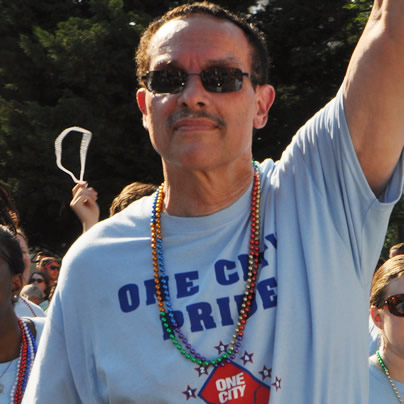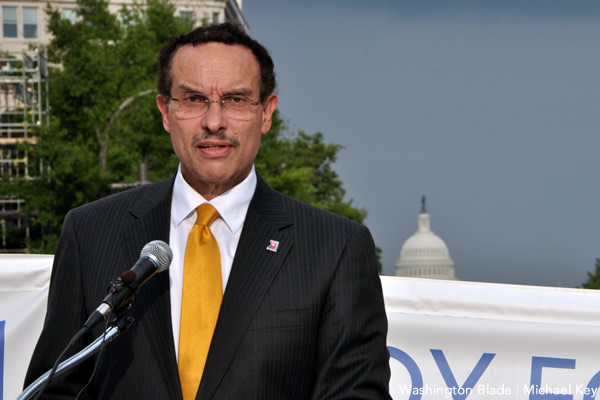Local
Gray under fire from McClurkin, D.C. ministers
City to pay ‘ex-gay’ singer $10,000 for cancelled appearance


Mayor Vincent Gray withdrew an invitation for Donnie McClurkin to perform at last weekend’s festivities. (Washington Blade photo by Michael Key)
Controversial gospel singer Donnie McClurkin, who has said God delivered him from the “sin” of homosexuality, has accused D.C. Mayor Vincent Gray of violating his civil rights by requesting that he withdraw as a performer at a concert last Saturday at the Martin Luther King Memorial.
Gray spokesperson Doxie McCoy released a statement to the Blade on the day before the concert saying the mayor directed the D.C. Commission on the Arts and Humanities to ask McClurkin to withdraw on grounds that his appearance would be a “distraction at an event about peace, love and justice for all.”
The mayor’s directive came one day after gay activist and longtime civil rights advocate Phil Pannell said McClurkin’s past inflammatory statements comparing gays to drug dealers and prostitutes were “vile” and were at odds with King’s call for ending discrimination and injustice.
The Commission on the Arts and Humanities, a city agency, organized the concert as the kick-off for a series of events over the next two weeks to commemorate the 50th anniversary of the 1963 civil rights March on Washington at which King delivered his famous “I Have a Dream” speech.
McCoy said the mayor’s office had not been aware that the commission invited McClurkin to perform at the concert, which was entitled “Reflections on Peace: From Gandhi to King.”
In a video released several hours before the 8 p.m. concert was scheduled to begin on Aug. 10, McClurkin said the mayor’s office and the Commission on the Arts and Humanities incorrectly claimed he and the city came to a mutual agreement that he withdraw as a performer.
“Last night on the way to the airport we received a phone call from the promoters who received word from the mayor’s office…that I was not welcome and uninvited the night before the concert,” McClurkin said on his video, which was posted on YouTube.
“It’s bullying,” he said. “It’s discrimination. It’s intolerance. It’s depriving someone of his civil rights when told he cannot come to an event and by coming it would cause a disruption.”
In an Aug. 11 press release, a spokesperson for the Baptist Convention of the District of Columbia and Vicinity said “pastors from throughout the city contacted the mayor’s office to insist” that McClurkin, himself a minister, be included in the concert as planned. The release says Gray ignored the request.
“Mayor Gray has systematically and deliberately done everything possible to strike at the fabric of the faith community – at least the sector of us who opposed his views,” Rev. Patrick J. Walker, president of the Baptist group, stated in the release. “This, however, is an atrocity and cannot be tolerated.”
Walker was among the leaders of the opposition to D.C.’s same-sex marriage law at the time the proposed measure came before the City Council in 2009.
The Washington Post reported Monday night that mayoral spokesperson Rob Marus said the city still plans to pay McClurkin $10,000 he is owed under a performance contract drawn up at the time the Commission invited him to take part in the event.
LGBT advocates in D.C. and in other parts of the country, upon learning of McClurkin’s latest comments criticizing the mayor’s decision to seek his withdrawal from the King Memorial concert, defended Gray’s action, saying McClurkin’s record as a leader of the “ex-gay” movement made him a divisive figure.
“If Donnie McClurkin was a white supremacist who called African Americans ‘vampires,’ ‘sissies’ and ‘evil’ people, then compared our existence to diabetes, he would never have been invited to perform on any stage in the District,” said gay Advisory Neighborhood Commissioner Anthony Lorenzo Green of Ward 8. Green was referring to words that McClurkin used to describe gay people in past public appearances.
“All I ask is we end the double standard,” Green said in a Facebook posting Monday night. “The days of the great Bayard Rustin are no longer here. There is no more delegating my gay brothas and sistas to the back room to shut their mouths for the good of the cause. We are all part of the cause!” he said.
Journalist and commentator Rod McCullom, who writes about issues affecting the black LGBT community on his blog Rod 2.0: Beta Gay News, disputed in a blog posting Monday night McClurkin’s claim that he was a victim of discrimination and bullying when Mayor Gray took steps to cancel his performance at the King Memorial.
“McClurkin is correct about one thing,” McCullom wrote. “This is about ‘bullying’ and ‘intolerance’…except he is not on the side of ‘love, unity, peace and tolerance.’ McClurkin has become the poster child for the church-based homophobia and intolerance that is harassing, bullying and making life horrible for millions of black gay, bisexual, lesbian and transgender youth in the church.”
Virginia
Walkinshaw wins Democratic primary in Va. 11th Congressional District
Special election winner will succeed Gerry Connolly

On Saturday, Fairfax County Supervisor James Walkinshaw won the Democratic primary for the special election that will determine who will represent Virginia’s 11th Congressional District.
The special election is being held following the death of the late Congressman Gerry Connolly, who represented the district from 2008 until 2024, when he announced his retirement, and subsequently passed away from cancer in May.
Walkinshaw is not unknown to Virginia’s 11th District — he has served on the Fairfax County Board of Supervisors since 2020 and had served as Connolly’s chief of staff from 2009 to 2019. Before he passed away, Connolly had endorsed Walkinshaw to take his place, claiming that choosing Walkinshaw to be his chief of staff was “one of the best decisions I ever made.”
The Democratic nominee has run his campaign on mitigating Trump’s “dangerous” agenda of dismantling the federal bureaucracy, which in the district is a major issue as many of the district’s residents are federal employees and contractors.
“I’m honored and humbled to have earned the Democratic nomination for the district I’ve spent my career serving,” Walkinshaw said on X. “This victory was powered by neighbors, volunteers, and supporters who believe in protecting our democracy, defending our freedoms, and delivering for working families.”
In addition to protecting federal workers, Walkinshaw has a long list of progressive priorities — some of which include creating affordable housing, reducing gun violence, expanding immigrant protections, and “advancing equality for all” by adding sexual orientation and gender identity to the Fair Housing Act.
Various democratic PACs contributed more than $2 million to Walkinshaw’s ad campaigns, much of which touted his connection to Connolly.
Walkinshaw will face Republican Stewart Whitson in the special election in September, where he is the likely favorite to win.
Maryland
LGBTQ suicide prevention hotline option is going away. Here’s where else to go in Md.
Changes will take effect July 17

By ANNA RUBENSTEIN | The national suicide prevention hotline will no longer offer specialized support to LGBTQ people, starting July 17, the Trump administration announced last week.
Dialing the hotline at 988 will still be available for crisis support. But callers will no longer be able to reach specific LGBTQ services by pressing Option 3. The change worries advocates because their data shows the LGBTQ community has a disproportionally high suicide rate.
Even after the option ends, here’s how to receive tailored support if you’re in Maryland.
The rest of this article can be found on the Baltimore Banner’s website.
Maryland
Silver Spring holds annual Pride In The Plaza
‘Today means inclusion. It means to build resilience’

Silver Spring’s annual Pride in the Plaza event took place on Sunday to celebrate the LGBTQ community and emphasize inclusion and resilience.
“Today means inclusion. It means to build resilience, love,” Robyn Woods, program and outreach director for Live In Your Truth, which organized the event, said. “I mean, just being surrounded by the community and so many great entrepreneurs, business owners, and just being a part of this whole rainbow coalition that we call the LGBTQIA to be about.”
With the event being her first time organizing for Live In Your Truth, Woods said she felt emotional to see the support and love at the event.
“Some people (are) bringing out their children, their babies, their grandparents,” Woods said. “It’s a lot more allies here than anything else. That type of support to me means so much more than just support from my community; just outside support, inside support, so much support around it, so much love. Everyone’s smiling outside, helping each other.”
Attendees of the event were able to head over to the Family Fun Zone, an air-conditioned Pride Cool Down Lounge, or watch live drag performances in the main stage area.
Along with entertainment and a shaved-ice stand, rows of information tables stood along the plaza, including FreeState Justice, the Washington Spirit, Trans Maryland, Moco Pride Center, and the Heartwood Program, an organization that offers support, therapy, education, and resources to the LGBTQ community.
“I want people to know about our services, and I love what we have to offer,” Jessica Simon, psychotherapist for Heartwood Program’s Gender Wellness Clinic, said. “I (also) want to be part of a celebration with the community, and so it feels good to be here with other people who have something they want to give to the community.”
She added that within today’s political climate, to which she called an “antidote to shame,” it’s important to be celebrating Pride.
“There’s a lot of demonization of LGBTQI people,” Siena Iacuvazzi, facilitator for Maryland Trans Unity, said. “(Pride) is part of the healing process.”
Iacuvazzi said she was taught to be ashamed of who she was growing up, but being a part of a community helped her flourish in the future.
“I was taught how to hate myself. I was taught that I was an abomination to God,” she said. “But being a community is like understanding that there are people who have experienced the same thing, and they’re flourishing. They’re flourishing because they’re willing to stand up for themselves as human beings and discover themselves and understand what’s true for themselves.”
She added that Pride allows for a mutual understanding to take place.
“It’s more of a sense of belonging … and just taking that home and understanding you’re not alone,” Iacuvazzi said. “We’re each taking our own journey — we’re not putting that on each other. It’s just walking away with a sense of belonging and humanity.”
Similar to Iacuvazzi, Woods said she hopes attendees’ biggest takeaways would be family, fun, resilience, and pride.
“Being proud of yourself, being happy for who you are, and representation and how much it matters,” she continued. “And I think all these young people that are walking around here get to see versions of themselves, but older. They get to see so many different lesbian, gay, bisexual, pansexual people that are successful, that are showing love, that care, and it’s not how we’re portrayed in the media. It’s lovely to see it out here. (It’s) like we’re one big old, happy family.”
-

 U.S. Supreme Court4 days ago
U.S. Supreme Court4 days agoSupreme Court upholds ACA rule that makes PrEP, other preventative care free
-

 U.S. Supreme Court4 days ago
U.S. Supreme Court4 days agoSupreme Court rules parents must have option to opt children out of LGBTQ-specific lessons
-

 Television5 days ago
Television5 days ago‘White Lotus,’ ‘Severance,’ ‘Andor’ lead Dorian TV Awards noms
-

 Music & Concerts5 days ago
Music & Concerts5 days agoBerkshire Choral to commemorate Matthew Shepard’s life












